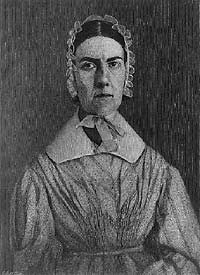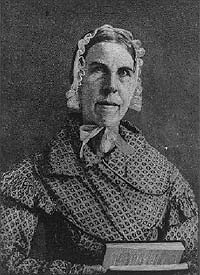Grimké Sisters

Angelina Emily Grimké, Courtesy of Library of Congress (LC USZ 61 1609)

Sarah Moore Grimké, Courtesy of Library of Congress (LC USZ 61 1608)
The Grimké sisters grew up on a slave owning plantation in South Carolina, but strongly disapproved of the practice of slavery. They spoke out against both slavery and the exclusion of women from public life. Sarah Moore Grimké (1792-1873) went to Philadelphia in 1821 where she joined the Quakers. Her sister Angelina (1805-1879) followed in 1829. Lucretia Mott was an important influence on their development as reformers with the formation of the. Philadelphia Female Anti-Slavery Society in 1835.
In 1836, Angelina Emily Grimké wrote An Appeal to the Christian Women of the South (available at www.gutenberg.org/etext/9915), which generated so much interest that the sisters were invited to attend the Agents’ Convention of the American Anti-Slavery Society in New York City. “Sarah and Angelina were the only women among the forty abolitionists who met daily between November 8 and 27 in an intensive training course under the leadership of Theodore Weld.” On May 28, 1837, they set out to lecture to the women of New England on abolitionism. (Lerner, 148)
The New England clergy were furious at the Grimké sisters’ boldness. By the end of July 1837, the clergy issued a Pastoral Letter of the General Association of Massachusetts to the Congregational Churches Under Their Care declaring that when "a woman assumes the place and tone of man as a public reformer…her character becomes unnatural." Sarah responded with An Epistle to the Clergy of the Southern States in 1838. Angelina wrote a series of "letters," later published as a book called Letters on the Equality of the Sexes, in which she asked for educational reform, equal wages, and an end to other forms of discrimination against women. Any hope of silencing the sisters failed as their lectures became even more popular.
Angelina gave her last public speech in 1838, a few days after her marriage to Theodore Weld, a leading anti-slavery reformer. The Welds became Abby’s mentors as seen in edited (corrections removed and disruptive spelling and punctuation corrected) excerpts from a letter by the Welds to Abby. Underlining is theirs.
Fort Lee New Jersey
2nd Mo. 24th [February 24,1838]
I know by sorrowful experience what it is to feel just as thou describest, having a work to do & yet not knowing how to do it__ opposed by all to who I was wont to look for counsel, & bowed down under a sense of my utter incapacity to do what was required at my hands. The bitterness of my soul for two long years I well remember, & O! how I bless the Lord for all the trials, humiliations & discouragements He threw in my way, besetting my faith with thorns on every side, …
I believe it is well thou hast nothing on earth on which to depend “no name—no reputation—no scrip neither money in thy purse “__ It is thus, the Lord is trying thy faith & showing thee what is in thy heart & proving thee whether thou art willing to go forth, leaning on the arm of thy beloved alone. I rejoice to hear thee say thou canst assuredly lean upon thy Heavenly Father in faith— So far thou art safe__ And if I dared to counsel thee I would say cultivate a filial, humble spirit—wait upon the Lord & he will renew thy strength__ Wait for him to make a way where there seems now to be no way—…I remain Thine for the slave A G Weld
[at bottom of page] My dear Sister
My table is filled full of papers waiting for attention and I have hardly time to write my name on this sheet__ Dear A has I see said something that looks as though she thought little preparation is necessary for you before you begin to lecture (I mean intellectual preparation). Now as to that I know a little having as you know as she little opportunity to judge of the power of your mind. That your manner of speaking will be interesting I have no doubt, and would I should think make people wish to hear you whether you possess of reasoning and analysis in ability to detect and expose fallacies & together with your discipline of mind are much as would with Gods blessing make you successful as a lecturer and master which you must decide for yourself from the best data you have. I exceedingly regret that you have not as I learn from your letter “done anything” in the way of preparing “ yourself__ Dear Abby God will help those who help themselves Do pray make yourself familiar with the whole subject read, study the leading Anti Slavery works. think, run out in your mind trains of arguments, take up the objections …[to] effectively shut up calling mouths. Again I pray you think exercise your mind. Do it habitually – do it thoroughly, break up the following and draw upon your resources, don’t be content to use merely the arguments you hear others use, if you do you will find your own mind shriveling and stagnating and instead of acquiring strength by lecturing it will run down under the process. From what I know of you and what I hear I have no doubt you will do good as a lecturer if you will prepare yourself by getting a thorough knowledge of the subject and by reining up your mind with through discipline strengthen your reasoning powers & Do pray commence it in earnest, and meanwhile as opportunity offers exercise your powers in public speaking, acquire self possession and the control of your mind…You keep a good heart dear sister. don’t faint…”
TD Weld
(Abby Kelley Foster Papers, BOX 2, 1941.08.2.4A, Worcester Historical Museum)
Educational Resource:
Lerner, Gerda. The Grimke Sisters. New York: Schocken Books, 1971.
“Reform Movements”. Learning Lab Historic Documents Collection. Old Sturbridge Village.

